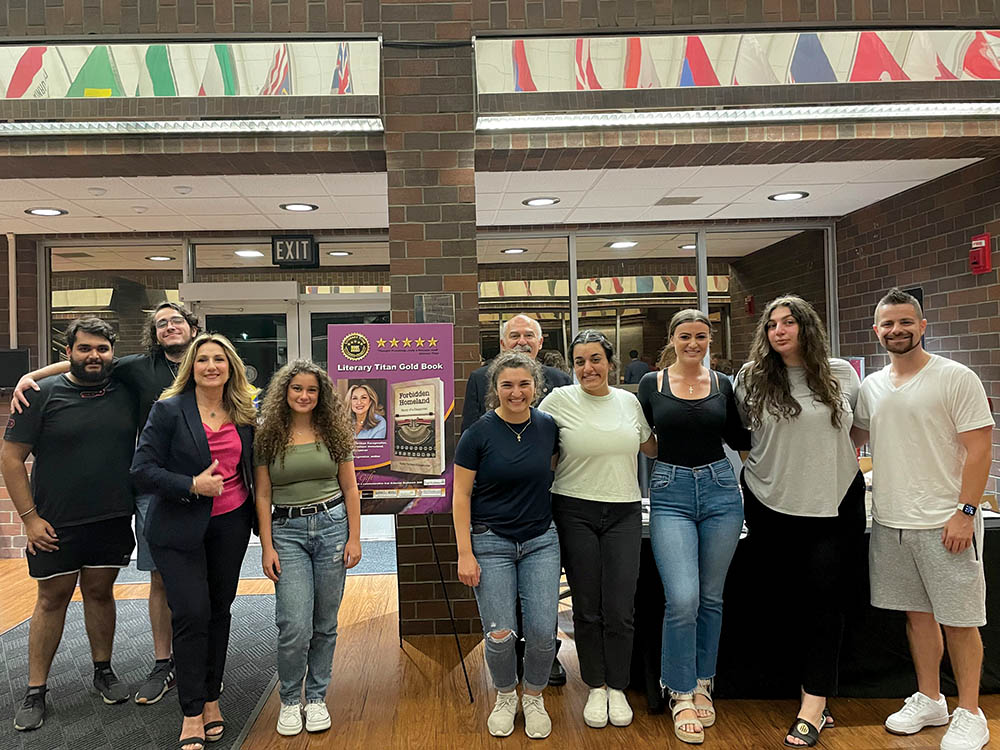“How can I get students to read the book?” said Dr. Katia Karageuzian during a discussion of her new book, Forbidden Homeland: Story of a Diasporan. Her presentation was part of the Armenian Studies Program Fall Lecture Series and was held on Friday, September 8, 2023, with many Fresno State students in attendance.
At her presentation, Dr. Karageuzian discussed the journey and reasons behind writing and publishing her book, stating, “it insisted to be written.” Her book dives into the intricate details of her family’s past, while also connecting her personal history to present-day Armenian related issues.
Dr. Karageuzian was born in Beirut, Lebanon, before she immigrated to the United States with her family in 1984. While attending school in Southern California in 1988, Dr. Karageuzian became friends with a couple of Armenian students. She discusses this more in the chapter of her book titled, “Malatya?” One day, as her two friends, Mariana and Siranush, were speaking Armenian to each other, Dr. Karageuzian blurted out, “You know, I am Turkish-Armenian too,” which she said even surprised herself. This statement led to what felt like “the shadows that had been following her all her life were finally closing in.” By digging into her family’s history, she uncovered a plethora of information connecting her family to Armenia, and to relatives located in modern-day Turkey who stayed behind following the Armenian Genocide.
Dr. Karageuzian briefly discussed the Hamidian Massacres that took place from 1894-1896 and the Armenian Genocide from 1915-1923. After discussing the horrific events that claimed the lives of nearly 2 million Armenians, Dr. Karageuzian said that, “the Genocide never stopped, it just took on different forms.” Her comment was in reference to the continued denial of the Armenian Genocide by the Republic of Turkey, as well as the continued struggle occurring in Artsakh.
“I am a piece of the Armenian nation’s dispersed and unrepresented majority – communities of descendants of orphans shipped to faraway lands. The overwhelming living, breathing body of evidence of an unpunished crime against humanity: the Armenian Diaspora,” said Dr. Karageuzian in “A Last Word,” the final chapter of her book.
Dr. Karageuzian’s presentation included showing visual material that was taken from her book. Some of these were family photos and others were historic maps of Armenia. One image depicted her grandfather’s clothing store, Tavitian Bros., which had been located in one of the busiest centers in Beirut before it was destroyed during the Lebanese Civil War. She also showed photos of apartment buildings in Bourj-Hamoud, with one photo of an Armenian flag flying between two apartment buildings’ balconies. She expressed how much she missed Lebanon, but was grateful to live in a country where Armenian-related issues can be discussed freely.
Dr. Karageuzian stated that living in a free country such as America also allows for false information to be spread as well. She discussed Azerbaijan and the Republic of Turkey’s continued efforts to publish false information and to distribute maps stating that historical Armenia is a part of Azerbaijan, in order to continue the war in Artsakh. “Armenia needs to release its arsenal of historic facts,” said Dr. Karaguezian.
When talking about Armenians needing to speak the truth about current events occurring in Artsakh, Dr. Karageuzian said, “Truth alone does not matter…it needs to be accompanied with spirit.”
Dr. Karageuzian discussed how for the longest time people were too worried about getting the Armenian Genocide inter-nationally recognized, and that other issues affecting Armenians arose rather swiftly. The 2020 Artsakh War, for example, be-came an issue that has been ongoing for the past three years. Now, almost exactly three years later, Azerbaijan has launched another war on the innocent people of Artsakh. Azerbaijan is aided by the Republic of Turkey in their actions.
As Dr. Karageuzian said at her presentation, “the Genocide never stopped, it just took on different forms.”
The presentation of Forbidden Homeland: Story of a Diasporan, provided a glimpse into Dr. Karaguezian’s personal experience, and connected her family’s Armenian history and heritage to Armenia’s history, as well as today’s Armenian-related struggles.




